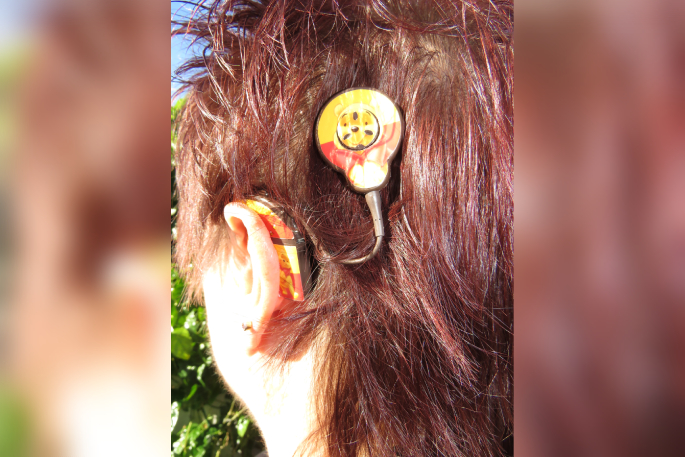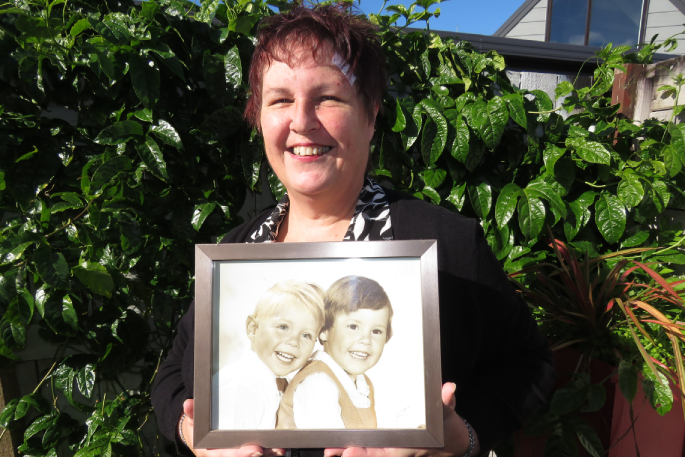Katikati resident Helen Ware reckons she can hear things she's never heard before since having cochlear implant surgery 10 months ago. 'Not until I got the cochlear did I hear what my finches sound like. They do little ‘peeps'.
'So not only am I getting new sounds, I'm getting them at a volume I've never had before. It's like a whole new world has opened up.”
But the 56-year-old doesn't want readers to think a cochlear implant is an instant fix for those who are deaf or hearing impaired. 'There's this public perception that you turn on the cochlear – you can hear! The number of times I've had to tell people – that is not how it works.”
When Helen's cochlear was turned on, there was only static. She's spent 10 months trying to retrain her brain to identify and listen for sounds. 'I've meet some incredible people at Hearing House – they do amazing work. So does Hearing Support Bay of Plenty.”
Age six
Helen's hearing journey began at age six. She'd fallen onto a concrete-based playground, landed on her back and hit her head. 'I saw a hearing specialist and, yes, I had a hearing problem – much to my horror I got a hearing aid at age six.”
At that stage her right ear was her good ear. Her left ear was her bad ear. In her Year 7 Christmas holidays, aged 11, Helen went to see specialist Bill Baber – a cochlear implant specialist – after showing a sharp drop [in hearing ability].
'He put me in hospital on bed rest on a drip in a general ward. It was a horrible experience. MRIs weren't a thing back then but they ran all the tests they could. After that when I got up I was dizzy and I kept telling mum: ‘My hearing aid is not working'.
No warning
'A week later Mr Baber realised my good ear had gone deaf – no warning, just gone!”
She received a hearing aid for her left ear – to amplify the hearing she had left. 'With a hearing aid I had 70 per cent of hearing in one ear. Without it, I had about 30-40 per cent.”
Amazingly, Helen was mainstream-schooled, she did ballet and even played sports such as netball. 'Imagine playing netball where there's 30 courts and whistles going everywhere and I have no directional sound!”
All of her jobs were initially frontline, customer service roles. 'At that point I was very much ‘I do for myself...' I didn't consider myself deaf. I identified as hearing impaired.”
She got married, had children, separated, worked full-time. Life went on. But in 2011 she applied for a hearing dog. 'As part of that I became a guest speaker – and spoke at a Cochlear Support group in Auckland. Talking to them I realised I met the criteria and could apply for a cochlear.”
What stopped her? 'As soon as you take off the processor, you're deaf. I could still function without a hearing aid back then – and I was worried I would lose what hearing I did have.”
October 2021
What changed? 'It was October 2021 – two weeks after I'd lost my job of 3.5 years, I'm sitting here with Sarah, my daughter. I'm talking to Sarah – gone! Nothing? No hearing!”
An urgent ear-nose-throat specialist visit resulted in a short course of steroids. It was too late. Her tinnitus went from a faded hum to a jet-plane overhead, and she was diagnosed with hyperacusis – extreme sensitivity to sound. When hearing dog Meg barked, she got a stab of pain.
'I went from some hearing to nothing. So I started researching why I had gone deaf, what my options were, and I got involved with Your Way - Kia Roha Hearing Therapy Tauranga.
'Therapist Angeline Slade tested me and said I could apply for a cochlear implant. She showed me one, and how they worked.”
Part of the on-boarding process is meeting someone with a cochlear. Helen met Linda Giltrap, who was about to get a hearing dog. 'She told me about cochlears, I told her about hearing dogs.”
Helen says it was a scary time for her. 'Everyone was still wearing masks [due to the Covid-19 pandemic] out in public.”
'Everyone you contact – Spark, Work & Income NZ – want to talk over the phone. I had to appoint Sarah as my WINZ agent as it got ridiculous every time I tried to contact them.”
Helen kept busy with her involvement in voluntary groups such as Katikati Lions. But a Covid-plagued world was tough for a lady relying on lip reading as her communication tool. 'You can imagine people wearing masks was a real challenge for me”.
'Here in Katikati, with Meg in her bright yellow coat – and a badge saying ‘I have a hearing impairment can you please drop your mask' most people would. If I wasn't sure I'd take Sarah and she'd drop her mask and repeat to me what they were saying – because we don't know sign language. I was brought up in a hearing world.
'Meanwhile I'm trying to see what to do with my finances because I've been laid off. My anxiety and depression became quite bad...I'm very lucky I have Meg, Sarah, my son Jaden and my parents in Katikati. They became my support network.”
In February 2022 Helen had a hearing test and met the criteria for a cochlear. But with implant allocation prioritised, she was facing an 18-month wait. Luckily, she was booked in for August 2022.
The cochlear
A magnet implant now sits underneath Helen's skin on her head above her left ear. The Speech Processor – outside the body – converts speech and environmental sound into a digital signal and sends it across the skin to the implant. The electrodes on the implant stimulate the cochlea's auditory (hearing) nerve fibres, and the auditory nerve carries the signal to the brain. The brain then interprets the signal as sound.
'When I woke up – no tinnitus, no hyperacusis. The surgeon found damage to the valves in my inner ear. We believe the fall I had at age six damaged the valves.”
Once the cochlear is switched on – what did she hear? 'Static. It's not an instant fix!” 'Slowly you begin to hear bzzz, bzzz.bbbz.bbbzzzzz.
'Luckily they warn you about this and give you homework to learn how to identify sounds, especially words, again.”
 Helen's cochlear implant sits underneath her skin on her head above her left ear. Photo: Merle Cave.
Helen's cochlear implant sits underneath her skin on her head above her left ear. Photo: Merle Cave.
Helen's had several 1.5 hour mapping appointments to adjust the Speech Processor, and 1.5 hour rehabilitation sessions. 'They work with you and make sure you're doing okay. They are magic, wonderful people at Hearing House. They constantly monitor you, adjust your settings and give you tasks to keep improving your hearing.”
Eventually Helen will have preset settings for a café environment, the movies, meetings etc.
Helen now a Cochlear Implant Consumer Group volunteer, emphasises she's still very much on her journey to retraining her brain to identify and hear sounds – without relying on lip reading But she doesn't regret her cochlear implant. 'Going from hearing impaired to deaf – I had nothing to lose.”

